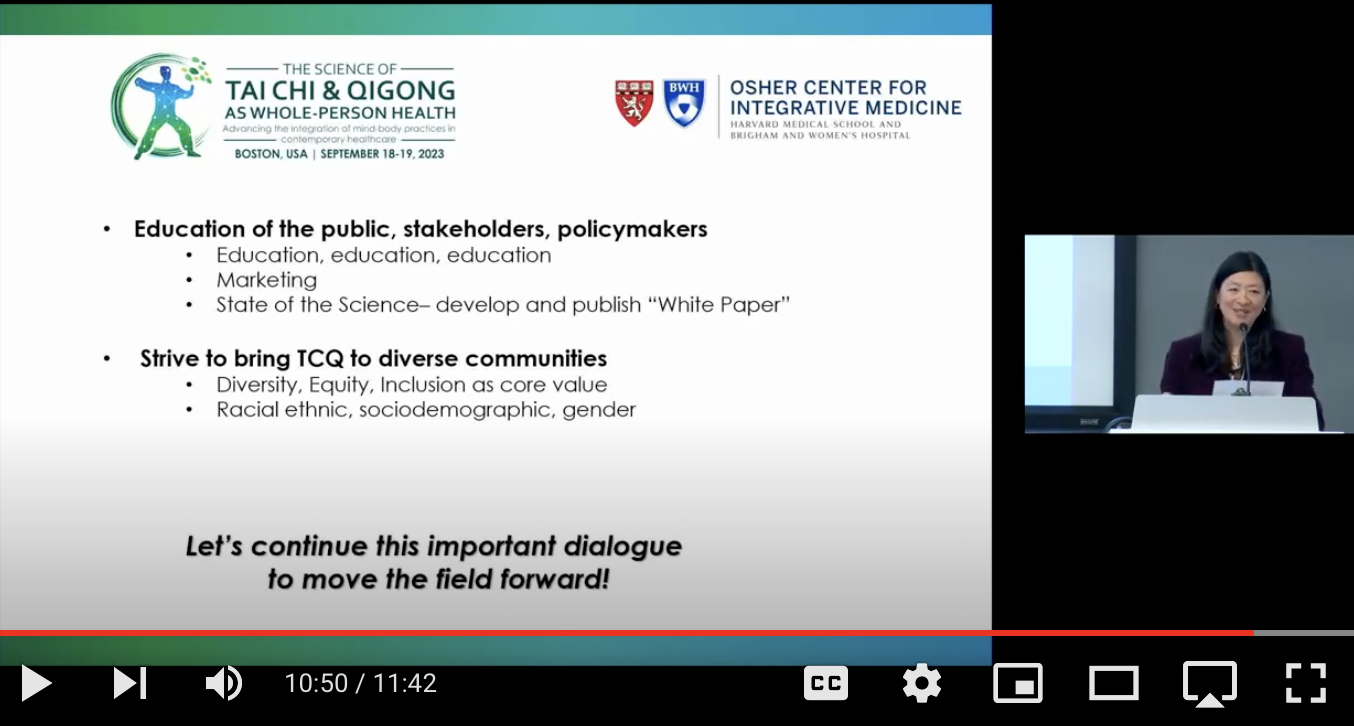
Event Details
Dates: Monday 18 – Tuesday 19, September, 2023
Format: In Person
Contact: [email protected]
Conference Overview
The Osher Center for Integrative Health hosted its inaugural Tai Chi conference in September 2023, entitled Tai Chi & Qigong as Whole Person Health – Advancing the Integration of Mind-Body Practices in Contemporary Healthcare. The conference attracted a diverse group of international scholars, practitioners, and healthcare administrators and policymakers, who addressed the current evidence base of Tai Chi, Qigong, and related mind-body practices, and explored topics integral to its growing and emerging role in whole person health, nationally and internationally. The dialogue of this conference was relevant across multiple mind-body disciplines and movement-based practices.
Video Recordings
Below are the conference recordings. Each of the five plenaries are available in their entirety with Q&A, as well as videos of each individual speaker. You may also wish to view the conference website: https://www.osherscienceoftcq.org
Day 1
Opening Remarks:
Whole Person Health and the Promise of Tai Chi and Qigong
Opening Remarks
Gloria Yeh, MD, MPH, Director of Clinical Research, Osher Center for Integrative Medicine, Associate Professor of Medicine, Beth Israel Deaconess Medical Center / Harvard Medical School
Remarks: Peter Wayne, PhD, Executive Director: Osher Center for Integrative Medicine, Associate Professor, Brigham and Women’s Hospital / Harvard Medical School
Tai Chi Performance: Calvin Chin, Chief Instructor and Master (Sifu), and Mynor Diaz of Calvin Chin’s Martial Arts Academy (CCMAA)
Welcome: David E. Golan, MD, PhD, Dean for Research Operations and Global Programs, Harvard Medical School (view full session video above)
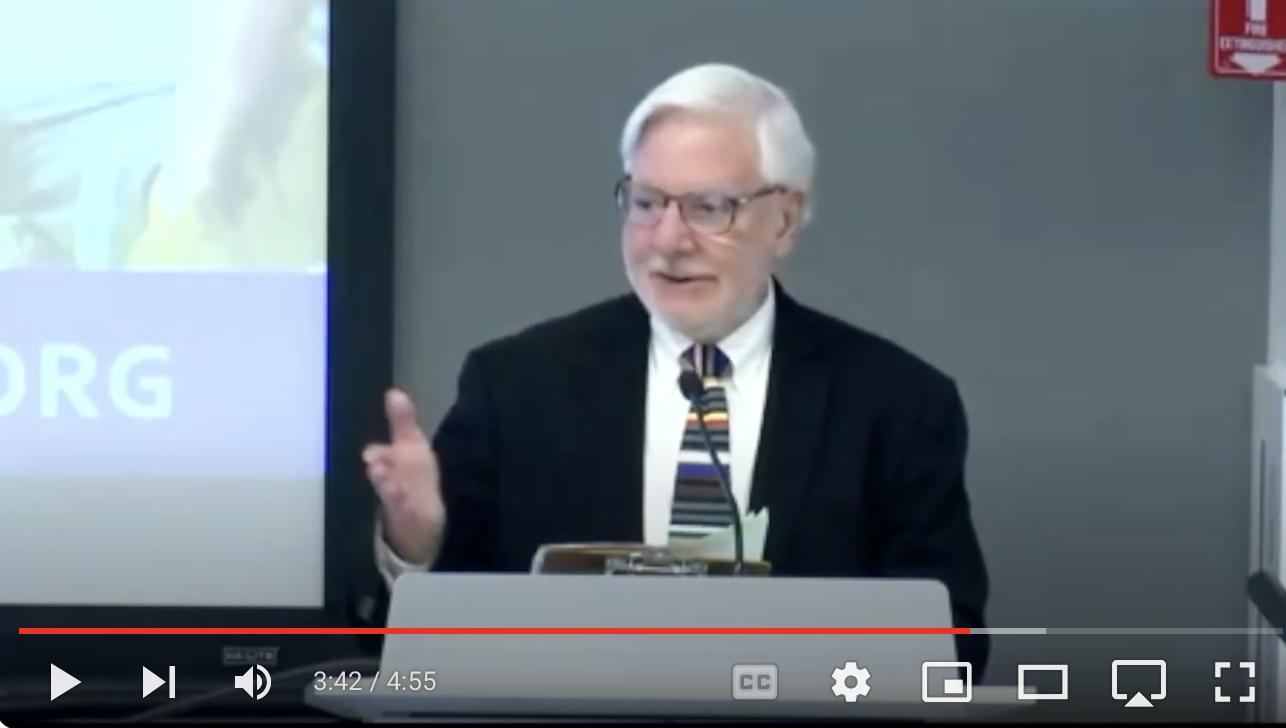
____________________________________________________________________________
Keynote and Plenary Session 1:
Whole Person Health: Integration Across Physiological Systems
This session will start off the conference and introduce the interconnected concept of whole-person health. It will highlight the essential need to understand the role of physiological cross-talk in health maintenance and rehabilitation, and thus the unique therapeutic potential for multi-modal interventions like Tai Chi and qigong. Presentations will feature key psycho-physiological interactions including connective tissue/immune/nervous system; cognitive-motor dynamics in aging; socioemotional stress/inflammation/heart-brain connections.
Moderator: Peter Wayne, PhD, Executive Director: Osher Center for Integrative Medicine, Associate Professor, Brigham and Women’s Hospital / Harvard Medical School
DAY 1 KEYNOTE: “Physiological Connections through the Fascia and Interstitium Network” – Helene Langevin, MD, Director, National Center for Complementary and Integrative Health (NCCIH), National Institutes of Health (NIH)
The Mind-Body Control of Balance and Gait in Older Adults – Brad Manor, MD, Associate Scientist, Marcus Institute, Hebrew SeniorLife
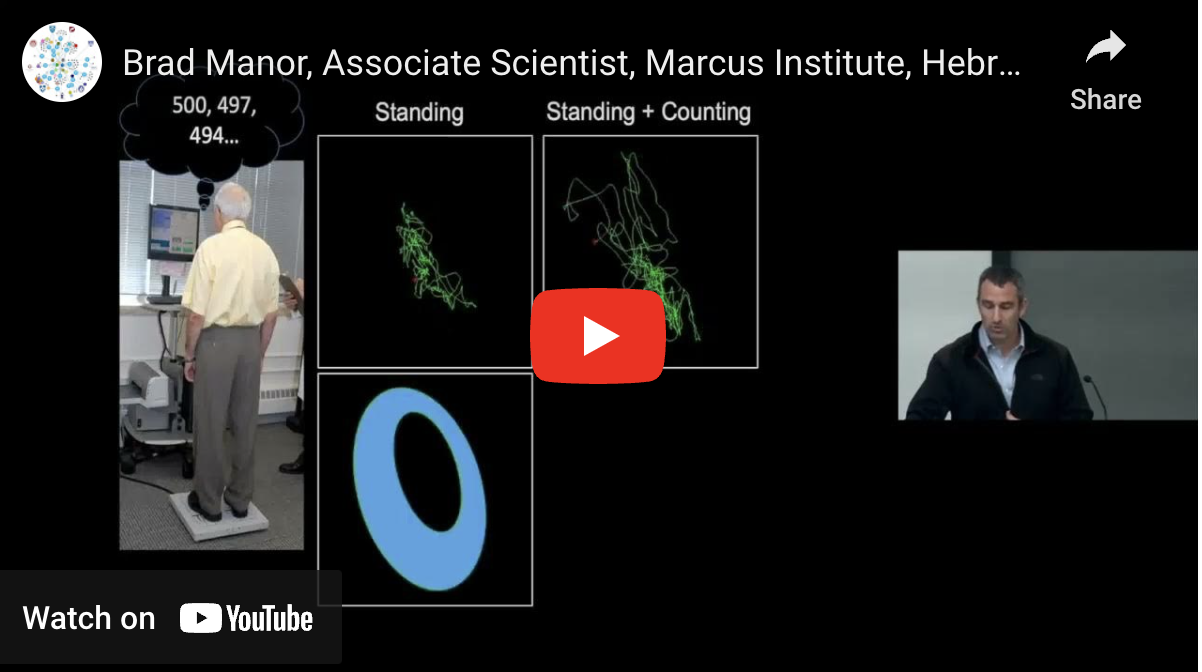
Neuro-Immune-Cardiovascular Cross-Talk Mediating Heart-Brain Interactions – Ahmed Tawakol, MD, Co-Director Cardiovascular Imaging Research Center, Mass General Hospital /Harvard Medical School
____________________________________________________________________________
Listen to Your Body: Interoceptive Awareness of Breath, Body, and Movement, A Key Process in Tai Chi
This session will present interoceptive awareness as a key concept in mindful movement, its theory, neurological underpinning, associated brain activity, and clinical measurement. There is a clear overlap with mindfulness practices. Practitioners report that these contemplative practices can calm the thinking mind by listening to the subtle language of the body, by changing from a ruminative cognitive mode to a sensory mode. The awareness of breath, body, and movements connects mind and body and can lead to an embodied experience of their of their unity. Paying attention, becoming aware of, and potentially regulating this interaction is interoceptive awareness. This symposium will present the concept of interoceptive awareness in more detail, its neurological underpinnings and related activities in the brain, its measurement, and findings from recent research studies.
Moderator: Wolf Mehling, MD, Integrative Physician, Research Faculty, Professor, University of California, San Francisco
Learning Not to Fear – Sara Lazar, PhD, Psychiatric Neuroscience Research Program, Massachusetts General Hospital
The Effect of Tai Chi Chuan on Interoception and Underlying Brain Mechanisms – Gao-Xia Wei, PhD, CAS Key Laboratory of Behavioral Science, Institute of Psychology, Chinese Academy of Sciences
____________________________________________________________________________
Oral Abstract Session 01
Moderator: Albert Yeung, Massachusetts General Hospital/ Harvard Medical School
OA1.01: Co-designing a Community-based Cardiac Rehabilitation Program for Chinese Migrants in Australia: A Mixed Method Study – Guoyan (Emily) Yang, NICM Health Research Institute, Western Sydney University
OA01.02: Can Tai Chi Make Older Adults ‘Functionally’ Younger? Yan Ma, Osher Center for Integrative Medicine, Division of Preventive Medicine, Brigham and Women’s Hospital and Harvard Medical School
OA01.03: Yoga for Chemotherapy-Induced Peripheral Neuropathy: From Phase IIB to Phase III Clinical Trial -Mingxiao Yang, Memorial Sloan Kettering Cancer Center
OA01.04: The Effect of Yoga on Frailty in Older Adults: A Systematic Review – Julia Loewenthal, Brigham and Women’s Hospital
____________________________________________________________________________
Adapting Randomized Controlled Tai Chi Trials for Remote Delivery: Is Going Virtual the New Normal
DeAnna Mori, Assistant Professor, Boston University Chobanian & Avedisian School of Medicine
Barbara Niles, Dr., National Center for PTSD at VA Boston Healthcare System, Boston University School of Medicine
Chenchen Wang, Professor of Medicine, Tufts Medicine
____________________________________________________________________________
Plenary Session 2:
State of the Science in Tai Chi & Qigong Research Part 1
This session will summarize the state of the evidence for Tai Chi and qigong in health and its connection to whole-person health. This will include the most current overview of the scientific literature, new studies in the pipeline, gaps in evidence, and opportunities to advance the field. Presentations will highlight Tai Chi/qigong for fall prevention, Tai Chi/qigong and cognitive health, neurophysiological mechanisms of Tai Chi/qigong, and Tai Chi/qigong and mental health.
Moderator: Albert Yeung, Massachusetts General Hospital/ Harvard Medical School
Impact of Tai Ji Quan Training to Prevent Falls Among Community-Dwelling Older Adults – Fuzhong Li, PhD, Senior Research Scientist, Oregon Research Institute
Exploring the Cognitive Impact of Tai Chi and Qigong: Current Understanding and Future Research – William Tsang, Department of Physiotherapy, Hong Kong Metropolitan University
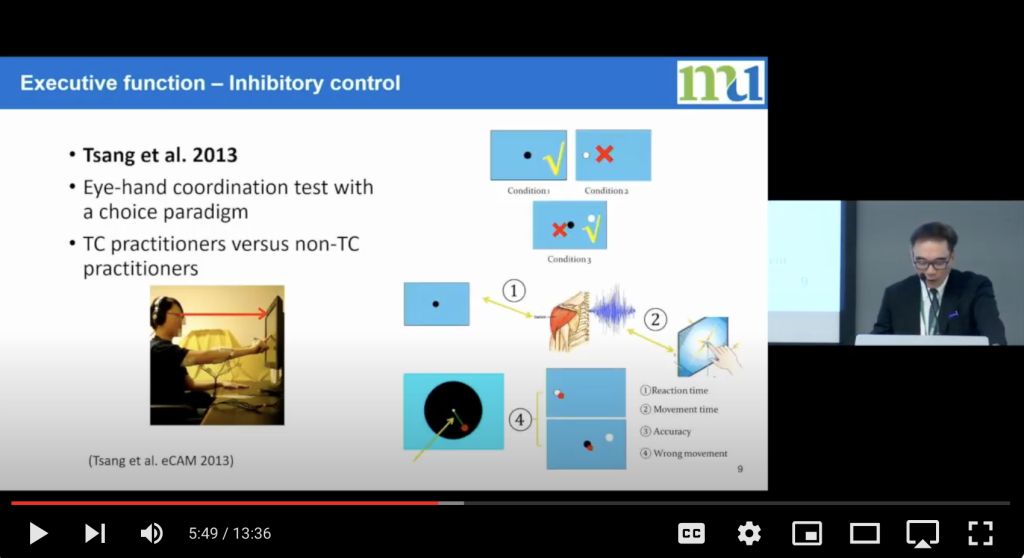
Brain Mechanisms Underlying Tai Chi in Pin Management – Jian Kong, Professor, Massachusetts General Hospital
Neurobiological Mechanisms of Response to Tai Chi in Geriatric Depression – Helen Lavretsky, Professor In-Residence in the Department of Psychiatry, UCLA
____________________________________________________________________________
Plenary Session 3:
Implementation of Mind-Body Practices in Contemporary Healthcare
This session will introduce broad issues regarding the professionalization and implementation of Tai Chi and qigong, and their relevance to integration with contemporary healthcare. As an example, the session will feature an overview of the successes and challenges encountered in the implementation of Tai Chi in the Veterans Affairs medical system.
Moderator: Darshan Mehta, MD, MPH, Medical Director & Education Director, Osher Center for Integrative Health
The Professionalization of (Allied) Health Traditions/Healthcare-Related Fields: The Rationale, and the Pros and Cons – Daniel Seitz, Consultant, Daniel Seitz Consulting
An Overview of Tai Chi and Qigong and Complementary and Integrative Health Services in the Veterans Health Administration – A Whole Health System Transformation – Janet Clark, Senior Physician Lead for Integrative Health and Education, Veterans Health Administration, Office of Patient Centered Care and Cultural Transformation Veterans Health Administration
____________________________________________________________________________
Day 2
Welcoming Remarks
Gloria Yeh, MD, MPH, Director of Clinical Research, Osher Center for Integrative Medicine, Associate Professor of Medicine, Beth Israel Deaconess Medical Center / Harvard Medical School
Peter Wayne, Executive Director: Osher Center for Integrative Medicine, Associate Professor, Brigham and Women’s Hospital / Harvard Medical School, introduces Arthur Goodridge of “Moving Together” – who shares an opening performance
Plenary Session 4:
Explorations in Body Intelligence: Examples from Western and East Asian Medicine
This session will explore unique boundaries between traditional concepts, such as Qi, and leading-edge modern principles of biophysics and developmental biology. Specific topics will include electromorphogenesis, meridians and acupoints, and the scientific exploration of traditional East Asian medicine concepts such as Qi.
Moderator: Helene Langevin, MD, Director, National Center for Complementary and Integrative Health (NCCIH), National Institutes of Health (NIH)
Molecular Mechanisms of the Wisdom of the Body: From Basal Cognition to Next-Generation Regenerative Medicine – Michael Levin, PhD, Distinguished Professor and Vannevar Bush Chair, Tufts University
From Fluorescent Dyes to Electrokinetics: Bioelectrical Mechanisms in Eastern Medicine – Andrew Ahn, MD, Chief Medical Offier & Osher Affiliate Faculty, Labfront + Osher Research Center
“To Qi or Not to Qi”: Personal Observations on the Integration of Traditional Concepts of Qi into Research, Practice, and Teaching of Tai Chi and Qigong – Peter Wayne, PhD, Executive Director, Osher Center for Integrative Medicine, Associate Professor, Brigham and Women’s Hospital / Harvard Medical School
____________________________________________________________________________
Supporting Well-Being Through the Integration of Qigong, the Arts, and Social Justice
In this panel session, we will explore the potential for qi gong as an integrative practice to support wellbeing, healing, and social justice. Dr. Gigi Otálvaro will discuss teaching arts and humanities courses at Stanford University that integrate qigong to support student mental health. Dr. Kathy Yep will reflect on fostering the sociological imagination in pre-health students at the Claremont Colleges through qi gong and student-centered pedagogies. Dr. Gwen DArcangelis will share her research on qigong as a self-healing modality particularly compatible with disability justice practices that center patient autonomy and flexibility in the face of challenging contexts. In doing so, this panel features the centrality of higher education and social justice spaces as points of intervention for integrating mind-body practices into healthcare.
Gwen D’Arcangelis, Associate Professor and Director of the Gender Studies Program, Skidmore College
Gigi Otalvaro, Associate Director, Stanford Living Education and LifeWorks Program for Integrative Learning, Stanford University
Kathleen S. Yep, Professor, Asian American Studies, Pitzer College (of the Claremont Colleges)
____________________________________________________________________________
Oral Abstract Session 02
Moderator: Wolf Mehling, Integrative Physician, Research Faculty, Professor, University of California San Francisco
OA02.01: Effects of Community Based Tai Chi on Mental Health in Older Adults: Interoception as a Potential Mechanism – Laura Redwine, University of Miami School of Medicine
OA02.02: Metabolic Impairments Associated with Type 2 Diabetes Miletus and the Potential Therapeutic Effects of Tai Chi Based on Untargeted Metabolomics – Furong Zhang, Chengdu University of Traditional Chinese Medicine
OA02.03: A Web-based Mind-Body Intervention (Mindful Steps) for Promoting Walking in Chronic Cardiopulmonary Disease: A Pilot RCT – Kristen Kraemer, Harvard Medical School/Beth Israel Deaconess Medical Center
OA02.04: Effects of Tai Chi Plus Usual Care for Chronic Heart Failure: A Systematic Review and Meta-analysis of Randomized Controlled Trials – Guoyan (Emily) Yang, NICM Health Research Institute, Western Sydney University
____________________________________________________________________________
Getting Involved and Contributing to TCQ and Mind-body Scientific Research: Practical Guidance for Instructors
Advancement of the scientific evidence base for TCQ and related mind-body therapies requires a partnership between experienced instructors and the scientific medical community. Input from mind-body experts is required at all stages of research, from the framing of sound study questions with well-match interventions, to the delivery of programs in clinical trials and the interpretation and dissemination of findings. However, for practitioners and instructors that do not work in health care settings or that lack scientific/medical training, it can be difficult to forge connections with the academic medical community.This panel will broadly discuss ways for TCQ and related mind-body instructors to get involved in research. It will discuss practical tips for learning about opportunities for partnership in ones local community (and beyond), best practices for reaching out to develop collaborations / partnerships, practical initiatives for hands on learning including teaching in trials, sharing challenging patients and writing case studies, and helping in the conception and design of pilot clinical studies. Resources for additional training will also be discussed, including for those interested in pursuing an academic research career studying TCQ and related mind-body medicine.
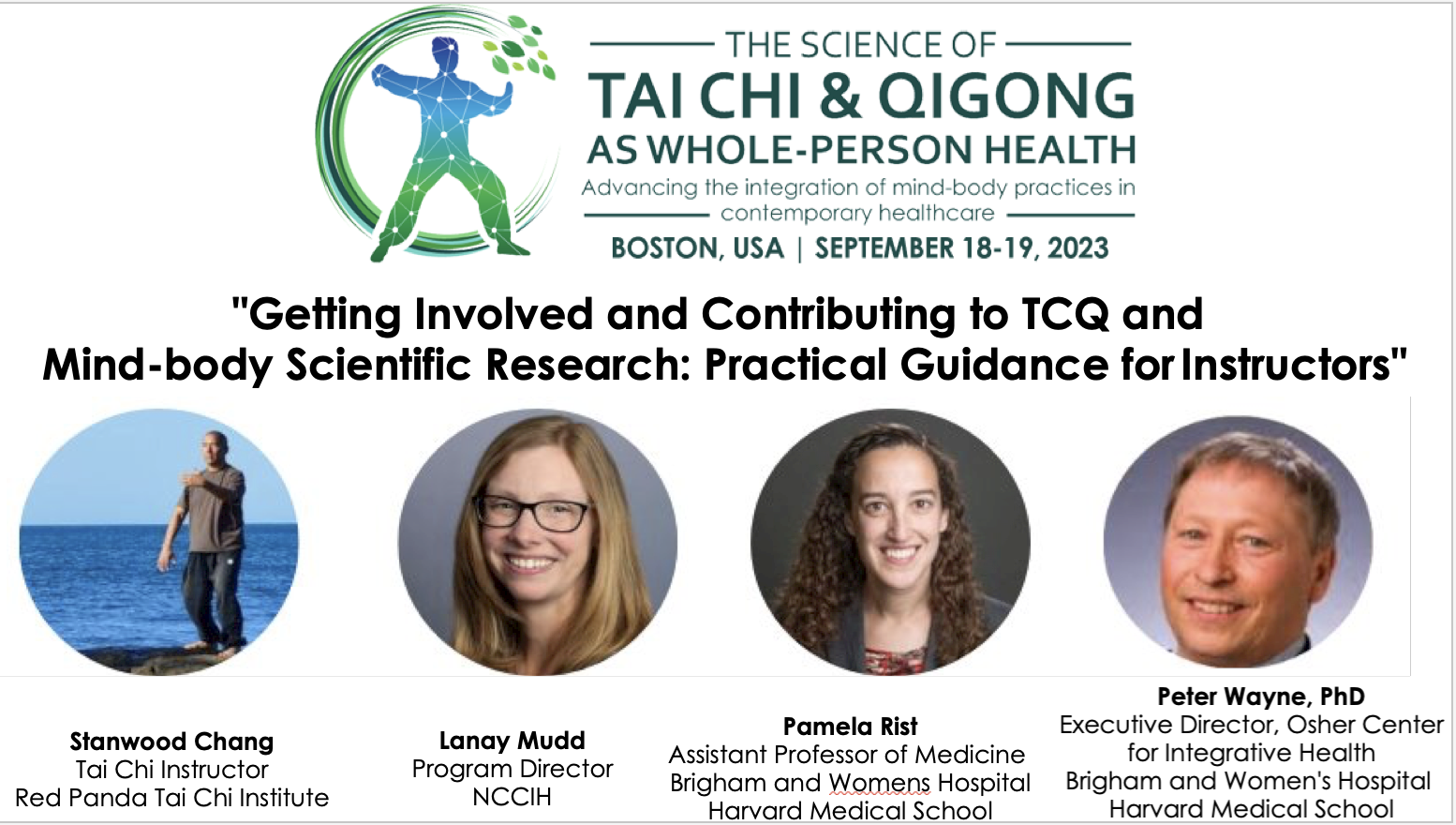 Stanwood Chang, Tai Chi Instructor, Red Panda Tai Chi Institute
Stanwood Chang, Tai Chi Instructor, Red Panda Tai Chi Institute
Lanay Mudd, Program Director, Clinical Research in Complementary and Integrative Health Branch Division of Extramural Research, National Center for Complementary and Integrative Health (NCCIH)
Pamela Rist, Assistant Professor of Medicine, Associate Epidemiologist, Harvard Medical School, Brigham and Women’s Hospital
Peter Wayne, Executive Director, Osher Center for Integrative Medicine, Associate Professor, Brigham and Women’s Hospital / Harvard Medical School
____________________________________________________________________________
Diverse Community TCQ Practices Symposia Parts One & Two
This presentation will discuss the applicability of QiGong practices to cope with daily stress and cultivate body-mind interconnectedness as a non-dual space of awareness among people of color. According to an American Psychological Association’s national survey in 2022, 27% of participants reported being so stressed that they could not function. The racial climate and other social stressors have negatively affected BIPOC’s mental health, particularly after the COVID-19 pandemic. Additionally, mental health care systems have historically faced the challenge of providing accessible and evidence-based interventions to people of color. In the last five years, a series of mindfulness sessions incorporated QiGong practices to facilitate stillness in movement among novice meditation practitioners and raise the importance of mental health prevention strategies in community centers in Massachusetts.
Part Two: Reaching Diverse Communities with TCQ: Case Studies in Integrative Medicine and Community Engagement in Harlem, Philadelphia, Newark, and Camden, NJ – Malik Cadwell, Project Coordinator & Mind/ Body Therapist, Memorial Sloan Kettering Cancer Center, Merchantville, NJ
In this presentation, Mr. Cadwell shares his journey and experiences as an African American TCQ practitioner and clinician from Camden, NJ using TCQ to engage diverse communities. He currently shares TCQ as Mind/Body therapy in Integrative medicine with Pediatric cancer patients both in inpatient and outpatient settings in NYC. Cadwell uses TCQ to engage diverse communities in this role by teaching in person and virtual sessions in Harlem. This journey led from a once weekly Tai Chi class at Rutgers Camden to teaching TCQ at RU Newark, OLLI-RU and at Temple University’s Kinesiology Department, Confucius Institute, Upward Bound and an invitation to demonstrate TCQ for the 2022 Beijing Olympics. Mr. Cadwell also engages diverse communities by collaborating with public libraries through in person and virtual workshops with teens, veterans, seniors, people who are incarcerated and the bookmobile.
____________________________________________________________________________
Oral Abstract Session 03
OA03.01: Tai Chi Unidos: Feasibility and Cultural Fit of Qigong/Tai Chi for Latinx Older Adults with Cardiometabolic Disease Risk – Linda Larkey, Arizona State University
OA03.02: A Pragmatic Approach to Advancing the Integration of Mind Body Practices in Contemporary Healthcare: Mindfulness in Motion – Maryanna Klatt, The Ohio State University College of Medicine, Center for Integrative Health
OA03.03: Integrating Chiropractic Care and Tai Chi for the Treatment of Chronic Non-specific Neck Pain in Nurses: a Single Arm Mixed-Methods Pilot Trial – Wren Burton, Osher Center for Integrative Medicine – Harvard Medical School and Brigham & Women’s Hospital
OA03.04: Study of the Central Nervous Mechanism of the Gastrointestinal Regulation Effect of Taijiquan: A Pilot Study – Yuke Teng, Chengdu University of Traditional Chinese Medicine
____________________________________________________________________________
The Training and Credentialing of TCQ Instructors: Is There a Need for (Inter)national Guidelines?
Most healthcare professions in North America, including some of those that fall within what is referred to as complementary and integrative healthcare (e.g., acupuncture, naturopathy, chiropractic), license or otherwise regulate practitioners based on a credentialing process established by law. The purpose of the credentialing process is to verify that professional training and competency standards have been met. Other complementary/integrative healthcare fields (e.g., yoga therapy, homeopathy, Ayurvedic medicine) that are not currently regulated by a governmental agency have established their own, independent training and/or certification requirements to ensure safe and effective clinical practice. While many Tai Chi and Qigong programs and organizations have developed their own training and/or certification/credentialing criteria, there are, to date, no universally agreed upon national or international guidelines for the credentialing of Tai Chi and Qigong practitioners/teachers/providers. This interdisciplinary panel presentation and discussion will provide an overview of the current state of credentialing for Tai Chi and Qigong. Among other topics, the panelists will explore some of the different approaches to training and credentialing currently found in the field of Tai chi and Qigong aimed at ensuring competent practice.
Moderated By: Daniel Seitz
Marie Favorito, Director and Senior Instructor, Universal Tao Boston,
Paul Lam, Director, Tai Chi for Health Institute
Shudong Li, Secretary General, World Taiji Science Federation
Byeongsang Oh, Associate Professor , Faculty of Medicine and Health, University of Sydney
____________________________________________________________________________
Qigong in the Treatment of Depressive Symptoms
We will explore the potential of Qigong as a treatment-component for depressive symptoms in several ways: First, we will address some conceptual issues in integrating Qigong into Western psychotherapy and present research findings on the embodiment of depression. Next we will present results on the efficacy of Body, Breath and Mind an online intervention combining body orientated Qigong practice with elements of behavioral activation. Data from an uncontrolled pilot study and preliminary results of a randomized controlled study with 303 participants will be presented. Referring to Compassion-Focused Therapy we will also discuss the utility of a compassionate relationship with the body. Interwoven with these science-related elements, central Qigong exercises from BBM will be practiced and their backgrounds will be presented.
Johannes Graser, Ph.D., Witten/Herdecke
Johannes Michalak, Prof. Dr., Witten/Herdecke University
Tobias Puntke, M.A., TaijiDao Association Münster
____________________________________________________________________________
Oral Abstract Session 04
Moderator: Darshan Mehta, MD, MPH, Education Director and Medical Director, Osher Center for Integrative Health
OA04.01: Two-year Participatory Planning Model to Adapt and Disseminate Inclusive Tai Chi Prime in African American/Black and Hispanic Communities (Phase 1) – Kristine Hallisy, University of WI-Madison1
OA04.02: Effects of Tai Chi and Qigong on Cognitive Function in Older Adults: Systematic Review and Meta-analysis – Rhayun Song, Chungnam National University
OA04.03: Key Components of a Qigong Intervention for People with Multiple Sclerosis: A survey of Clinicians, Researchers, and Instructors – Lita Buttolph, The National University of Natural Medicine
____________________________________________________________________________
Women in Tai Chi: Past, Present, and Future
Women have been at the forefront of the self-care movement in recent years, and attendance at Tai Chi and Qigong classes has increased. However, the benefits of these practices are still not as well understood or popular as they could be. Despite their growing popularity, only 15% of Tai Chi teachers in the U.S. are women. This panel will discuss the history and current role of women in Tai Chi and Qigong, recent research into the benefits for women’s health, and if and how gender matters for teachers and students. The panel will also discuss the lack of female Tai Chi teachers, reasons, and how we might rectify this deficit.
_______________________________________________________________________________________
Sharon Smith, Senior Instructor; Qigong Global Summit host; Creatrix/Director, Universal Healing Tao; Shift Network; Immortal Sisters Conference
Violet Li, Principal, Tai Chi & Qigong for Health
Ruth Taylor-Piliae, Professor and Interim PhD Program Director, University of Arizona College of Nursing
Josie Weaver, Past President (President Emerita), Healer Within Foundation
____________________________________________________________________________
Plenary Session 5:
State of the Science in Tai Chi & Qigong Research Part 2
This session will summarize the state of the evidence for Tai Chi and Qigong in health and its connection to whole-person health. This will include the most current overview of the scientific literature, new studies in the pipeline, gaps in evidence, and opportunities to advance the field. Presentations will highlight: Tai Chi/qigong and immune function, Tai Chi/Qigong in cancer, Tai Chi/Qigong for musculoskeletal pain, and Tai Chi/Qigong in cardio-pulmonary conditions.
Moderator: Wolf Mehling, Integrative Physician, Research Faculty, Professor, University of California San Francisco
Tai Chi Augments Viral Specific Immunity and Reverse Cellular and Genomic Inflammation in Older Adults – Michael Irwin, Norman Cousins Distinguished Professor of Psychiatry and Biobehavioral Sciences, University of California, Los Angeles
Tai Chi and Qigong in Cancer Care: Current Evidence and Future Directions – Byeongsang Oh, Associate Professor , Faculty of Medicine and Health, University of Sydney, Australia
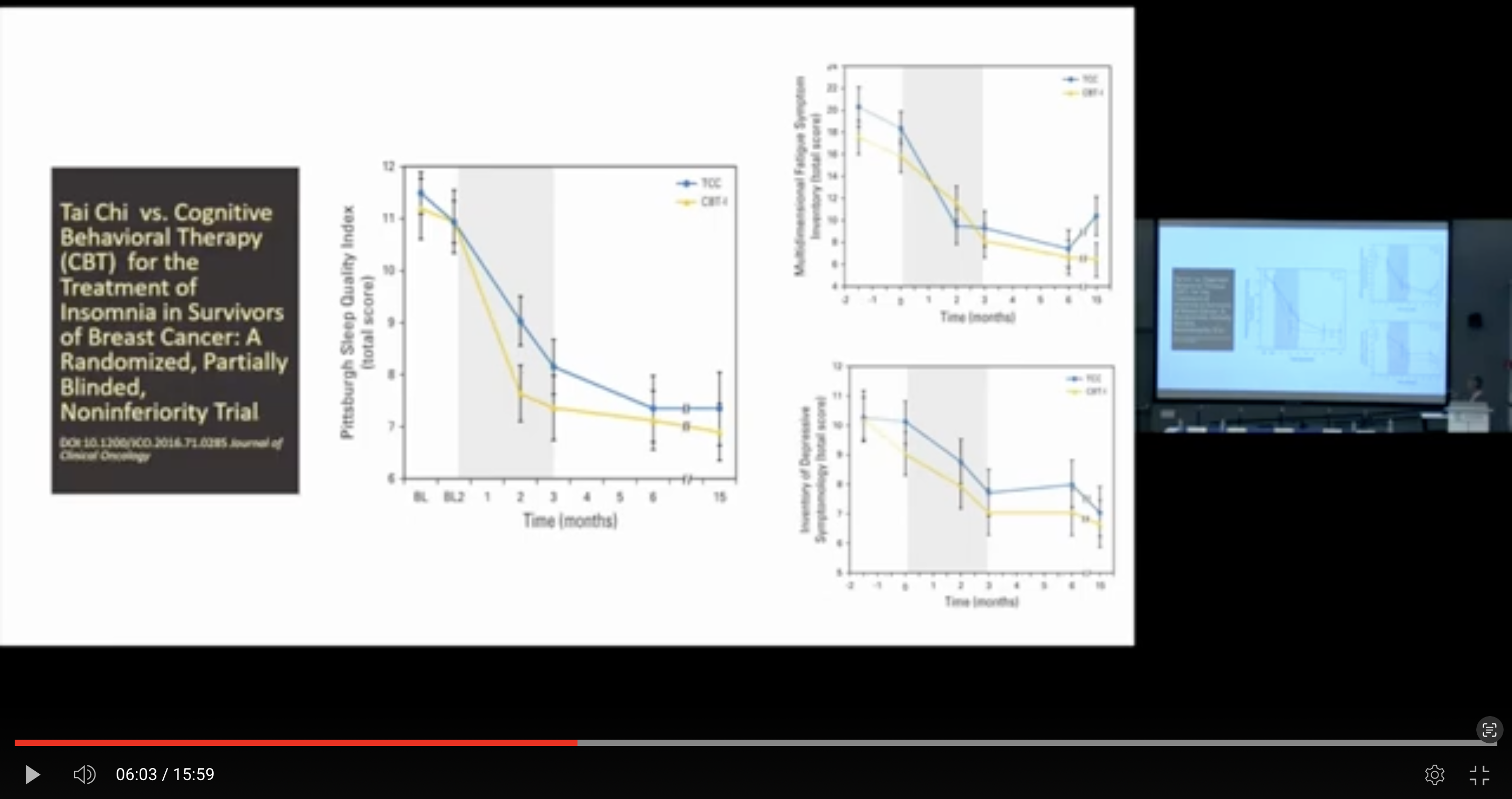
Tai Chi and Pain Management – Chenchen Wang, Professor of Medicine, Tufts Medicine
Chronic Cardiovascular and Pulmonary Disease and Tai Chi: Healing the Whole Person – Gloria Yeh, MD, MPH, Director of Clinical Research, Osher Center for Integrative Medicine, Associate Professor of Medicine, Beth Israel Deaconess Medical Center / Harvard Medical School
Closing Remarks
Gloria Yeh, MD, MPH, Director of Clinical Research, Osher Center for Integrative Medicine, Associate Professor of Medicine, Beth Israel Deaconess Medical Center / Harvard Medical School
